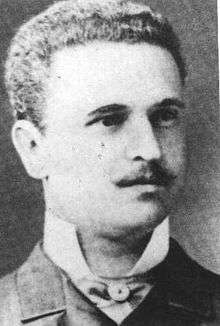Konstantin Stoilov
| Konstantin Stoilov Константин Стоилов | |
|---|---|
 | |
| 8th Prime Minister of Bulgaria | |
|
In office 10 July 1887 – 1 September 1887 | |
| Monarch | Ferdinand |
| Preceded by | Vasil Radoslavov |
| Succeeded by | Stefan Stambolov |
|
In office 31 May 1894 – 30 January 1899 | |
| Monarch | Ferdinand |
| Succeeded by | Dimitar Grekov |
| Personal details | |
| Born |
23 September 1853 O.S. Plovdiv, Ottoman Empire |
| Died |
March 23, 1901 (aged 47) Sofia, Bulgaria |
| Nationality | Bulgarian |
| Political party |
Conservative Party (until 1894) People's Party (1894–1901) |
| Occupation | Doctor of Law |
Konstantin Stoilov (Bulgarian: Константин Стоилов) (23 September 1853 O.S. – 23 March 1901 O.S. ) was a leading Bulgarian politician and twice Prime Minister. Simeon Radev described him as the most European-like of all Bulgarian politicians.[1]

Born in Plovdiv, Stoilov studied at Robert College in Istanbul, before studying law at Ruprecht Karl University of Heidelberg to doctorate level.[1] Whilst in Germany he became a Freemason.[2]
A career politician with the Conservative Party, and later his own People's Party,[1] he held a number of government portfolios including Foreign Minister, Law Minister and Interior Affairs Minister. His first reign as Prime Minister lasted only for a brief spell in 1887. He returned in 1894 to preside over a longer ministry, which was characterized by increasing toleration for the activities of the Internal Macedonian Revolutionary Organization[3] as well as fairer treatment of the Jews (as a lawyer, Stoilov had successfully defended the Jews of Vratsa from allegations of blood libel in 1890[4]). Stoilov's government faced a campaign of criticism from sections of the press as organised by his main political opponent Stefan Stambolov and as a consequence the Stoilov administration enacted legislation against Stambolov, notably sequestering his land for state use and abolishing the pensions paid to former government ministers.[5] The Stoilov-led coalition remained in office until 1899 when a series of liberal administrations began. He remained an important figure in Bulgarian politics until his death.
References
- 1 2 3 Profile of Stoilov
- ↑ HISTORY OF FREEMASONRY IN BULGARIA (Part I - from the First references to 1941)
- ↑ The Macedonian Issue
- ↑ Saving the Bulgarian Jews in World War II
- ↑ S.G. Evans, A Short History of Bulgaria, London, Lawrence and Wishart, 1960, p. 141
External links
- Works by or about Konstantin Stoilov in libraries (WorldCat catalog)